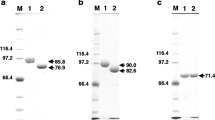Abstract
Penicillium roqueforti secretes an aspartyl protease, ASPA, which represents the main extracellular proteolytic activity. Alkaline pH of the medium plays a major role by inhibiting the enzymatic activity and stopping aspA expression in the presence of casein, an inducing protein. However, casein degradation by the mature enzyme produces peptides which can induce aspA expression at acidic and alkaline pH. ASPA synthesized as a proenzyme is processed at an acidic pH but not at an alkaline pH. The data indicate that, in P. roqueforti, alkaline pH has an indirect repressive effect by inhibiting ASPA maturation and the release of inducers. At an acidic pH, the mature enzyme degrades extracellular proteins and peptides are released to induce aspA. In contrast, at an alkaline pH, the proenzyme remains inactive, the inducing substances are consequently not produced and aspA is no longer expressed.
Similar content being viewed by others
Author information
Authors and Affiliations
Additional information
Received: 10 April 2000 / Accepted: 18 July 2000
Rights and permissions
About this article
Cite this article
Gente, S., Billon-Grand, G., Poussereau, N. et al. Ambient alkaline pH prevents maturation but not synthesis of ASPA, the aspartyl protease from Penicillium roqueforti . Curr Genet 38, 323–328 (2001). https://doi.org/10.1007/s002940000166
Issue Date:
DOI: https://doi.org/10.1007/s002940000166




